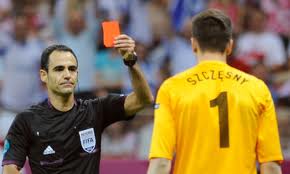By Andrew Warshaw
February 20 – Two controversial Champions League sendings-off this week have re-focussed attention on the so-called ‘triple punishment’ – penalty, sending off and subsequent suspension – that continues to so cause so must consternation throughout the game.
UEFA’s executive committee have made a point of tabling the issue at the forthcoming International FA Board meeting in the hope of finally clarifying the situation from football’s law-makers.
Manchester City and Arsenal both had a player red-carded, in Arsenal’s case goalkeeper Wojciech Szczesny, after conceding penalties against Barcelona and Bayern Munich respectively. Both decisions effectively killed each game, the visitors going on to carve out healthy 2-0 first-leg leads.
The rule has been hotly debated, with referees frequently applying different interpretations as to what constitutes a goal-scoring opportunity. Critics complain that a penalty would suffice in cases where the foul is not of a violent nature. The issue was controversially left off the agenda for last year’s IFAB meeting but is back on this year though it is by no means certain any clear ruling will be established.
UEFA are firmly against the existing law as their general secretary Gianni Infantino made clear after the organisation’s December executive committee meeting.
“The Executive Committee has asked IFAB to address the issue and clarify the situation at their next meeting so that there are no more red cards for fouls committed inside the box,” Infantino said at the time.
“We need to resolve the issue of the ‘triple punishment’ once and for all. Everyone is talking about it and feels it is an injustice.” UEFA boss Michel Platini says goalkeepers in particular face over-harsh treatment but is not holding out too much hope that IFAB – which comprises FIFA and the four British associations – will change the rules.
“It seems excessive. The penalty is itself already is punishment enough,” said Platini. “I think it’s something that everyone in FIFA and UEFA agree, but one or two of the countries that make up the International Board are unwilling to change.”
Contact the writer of this story at moc.l1745253541labto1745253541ofdlr1745253541owedi1745253541sni@w1745253541ahsra1745253541w.wer1745253541dna1745253541

